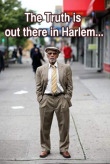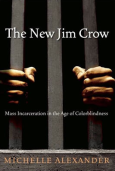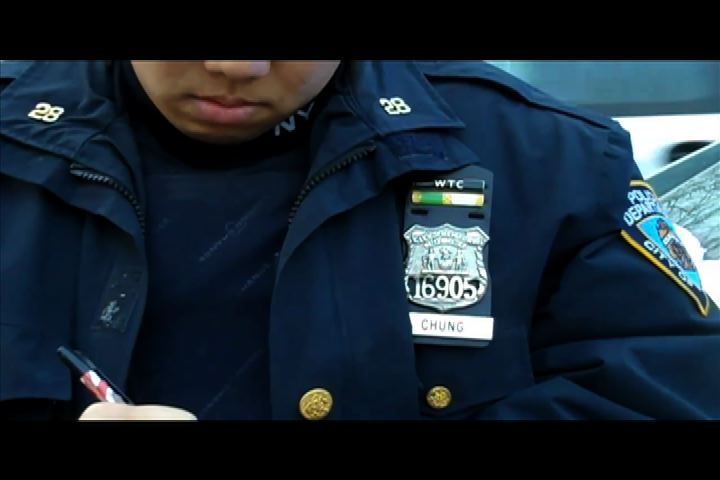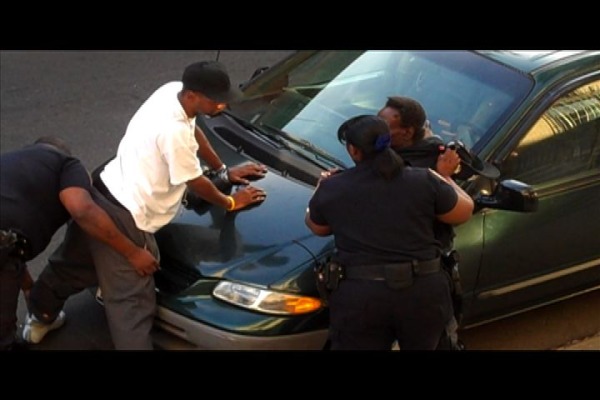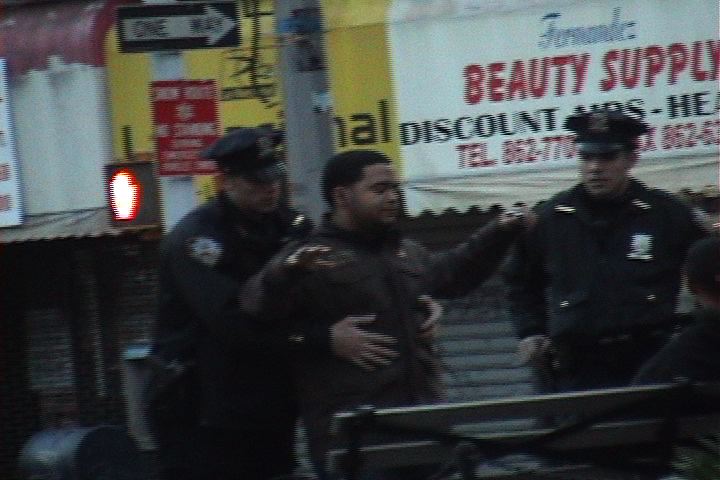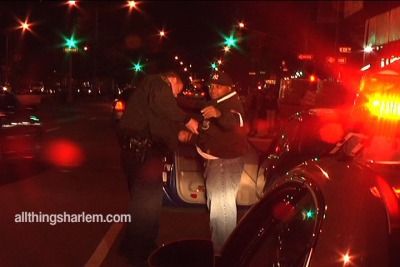 The Hornblower
The Hornblower
- vlogs, editorials and thoughts from Joseph "Jazz" Hayden - Founder of "Still Here" Harlem Productions and allthingsharlem.com. The story behind The Hornblower goes like this...
The Hornblower: Jazz Profiled for The Game Changers Project
 Monday, July 1, 2013 at 5:19PM
Monday, July 1, 2013 at 5:19PM Photojournalist and emerging filmmaker, Lyric Cabral, produced this video for, The Game Changers Project, profiling the work of Joseph "Jazz" Hayden, Founder of www.allthingsharlem.com.
The Game Changers Project - "The school-to-prison pipeline? I've lived it. Prisons? I've been there. Racial profiling? I've lived it." Meet Joseph "Jazz" Hayden, Harlem's own. We sent our NYC-based GCP Fellow Lyric Cabral to capture the story of this well-known game changer. In a past life, he was known for his business partnership with the famed Harlem hustler Nicky Barnes, but these days the 71 year-old Hayden, a longtime Harlem community activist, films stop-and-frisks and then posts the videos to the Internet as part of his Copwatch program. His story is amazing!
The Hornblower: Jazz Speaks on Mass Incarceration at Tedx Conference
 Thursday, June 13, 2013 at 2:31PM
Thursday, June 13, 2013 at 2:31PM Video
Joseph "Jazz" Hayden, Founder of allthingsharlem.com, speaks about the issues of mass incarceration at this Tedx Talk.
TEDx Talks - This talk was given at TEDxColumbiaCollege in November of 2012 at Columbia University in New York City. In the spirit of ideas worth spreading, TEDx is a program of local, self-organized events that bring people together to share a TED-like experience. At a TEDx event, TEDTalks video and live speakers combine to spark deep discussion and connection in a small group. These local, self-organized events are branded TEDx, where x = independently organized TED event. The TED Conference provides general guidance for the TEDx program, but individual TEDx events are self-organized.* (*Subject to certain rules and regulations)
Why The Police?
 Tuesday, September 4, 2012 at 12:34PM
Tuesday, September 4, 2012 at 12:34PM Outside of John Jay College, Students declined to appear on camera - Our youth are turning to law enforcement because it offers them the best job opportunity, not because of a desire to serve the people. One student even told me that he "hates" the police but he doesn't see an alternative.
 criminal justice,
criminal justice,  jazz hayden,
jazz hayden,  john jay college,
john jay college,  nypd,
nypd,  why the police?,
why the police?,  youth Tweet
youth Tweet Echoes of Juneteenth Haunt Us Today
 Wednesday, June 20, 2012 at 10:17PM
Wednesday, June 20, 2012 at 10:17PM An old but still relevant article from 2003.
The bittersweet holiday of Juneteenth reminds us that getting rights on paper is a far cry from getting them in practice.
By: Joseph "Jazz" Hayden for AlterNet.org
While this 138-year-old tale might at first seem like ancient history, echoes of the Juneteenth story resonate in the struggles people of color face today. Getting rights on paper, Juneteenth reminds us, is a far cry from getting them in practice.
That's what makes Juneteenth so bittersweet. On the one hand, it honors a great advance for African Americans -- gaining the rights of citizenship, especially the right to vote. But it also marks the beginning of an era in which whites imposed countless discriminatory laws, like poll taxes, literacy tests and grandfather clauses, meant to keep blacks powerless.
Many of these overtly discriminatory state laws have been called out as racist and unconstitutional, and have been wiped from the books. However, there is at least one notable exception: felony disenfranchisement laws.
Felony disenfranchisement laws are state-level rules that strip voting rights from citizens who have been convicted of certain crimes. If you commit a crime, these laws say, you lose the vote. There are no federal guidelines about them, so their harshness varies from state to state. The most extreme states -- such as Florida, Alabama, Mississippi, Kentucky and Virginia -- bar ex-felons from voting for life.
Is it coincidence that the harshest disenfranchisement laws are mostly in former slave states? Not in the slightest. Like poll taxes and literacy tests, the ostensibly race-neutral disenfranchisement laws were created to keep blacks from voting. In 1896, for example, Mississippi lawmakers ruled that only a narrow range of offenses -- bribery, burglary, theft, arson, perjury, forgery, embezzlement, bigamy and "obtaining money or goods under false pretenses" -- made you lose the vote. Why not murder or rape? Because ex-slaves were far more likely to commit petty property crimes than serious offenses.
Southern lawmakers were not shy about their intentions. "This plan," said one delegate to the Virginia convention of 1906, which established rules similar to Mississippi, "will eliminate the darkey as a political factor in this State in less than five years."
The laws worked. One Alabama historian found that by 1903, the laws had excluded nearly 10 times as many blacks as whites from voting.
Sound familiar? Today, our "tough on crime" policies -- especially our draconian drug laws -- disproportionately target people of color. Only 14 percent of illegal drug users are black, but blacks make up 74 percent of those sentenced for drug possession. One in three black men will be jailed at some point.
This translates directly into loss of political power. Blacks are denied the vote because of criminal records five times more often than whites. Fully 13 percent of African-American men are permanently disenfranchised, and many more have temporarily lost their voting rights. Latinos are also disproportionately affected, given that 16 percent of Latino men will enter prison in their lifetime. This leaves communities of color vastly under-represented in the political process.
Many states do restore voting rights to ex-felons after they leave prison. But once you make it out, it's Juneteenth all over again. You may have technically regained the right to vote, but no one tells you. This lack of notification puts thousands of Americans in the same position as the slaves of Texas -- on paper they have rights, but if no one tells them they can exercise those rights, they remain second-class citizens.
Fortunately, there are straightforward ways to fix these problems. Contrary to popular belief, felony disenfranchisement laws are not part of the criminal justice system. They are simply state election laws, and like any other state laws, they can be amended -- or abolished. That's happening in some states. Connecticut just upgraded its laws to allow 36,000 people on probation to vote. In New Mexico -- where ex-felons used to be disenfranchised for life -- Republican Governor Gary Johnson recently changed the law to automatically restore the vote to qualified ex-felons.
Still, on this Juneteenth, 4.65 millions Americans can't vote because of laws that have explicitly racist history. It's time that felony disenfranchisement laws go the way of poll taxes and literacy tests, so that next Juneteenth we can celebrate another victory on the road to democracy, racial equality and true emancipation.
Joseph "Jazz" Hayden is the lead plaintiff in Hayden v. Pataki, a lawsuit challenging felony disenfranchisement statutes in New York. He works for Demos, a nonpartisan public policy organization.
Jazz Hayden's Recent Radio Appearances
 Friday, April 20, 2012 at 11:29AM
Friday, April 20, 2012 at 11:29AM 
Jazz discusses his court cases and the subjects of mass incarceration and policing in our communities.
Click the links below for the two shows aired on WBAI 99.5 FM on thursday April 12, 2012.

Jazz also appeared on Bernard White's show on Community Progressive Radio, called Emanations.
Interview with Community Progressive Radio. (Jazz interview begins at 29:12 minutes)
 community progressive radio,
community progressive radio,  jazz hayden,
jazz hayden,  wbai Tweet
wbai Tweet The Economy is Busted!
 Tuesday, November 29, 2011 at 12:41PM
Tuesday, November 29, 2011 at 12:41PM Speaking at the Campaign to End The Death Penalty Convention in Austin Texas, 2011.
 jazz hayden,
jazz hayden,  the economy is busted Tweet
the economy is busted Tweet Check me out on NY1 story
 Saturday, July 30, 2011 at 6:30PM
Saturday, July 30, 2011 at 6:30PM  jazz hayden,
jazz hayden,  ny1,
ny1,  nypd,
nypd,  prop ny,
prop ny,  urban justice center Tweet
urban justice center Tweet My Podcast On The Attica Rebellion
 Monday, July 18, 2011 at 7:41PM
Monday, July 18, 2011 at 7:41PM Listen Here, to Lee Wengraf and myself speak about the Attica Rebellion which took place 40 years ago. This podcast was recorded at the Socialism 2011 Conference, in Chicago on July 1, 2011, and was recorded for Wearemany.org.
 attica rebellion,
attica rebellion,  jazz hayden,
jazz hayden,  podcast Tweet
podcast Tweet Hornblower Libya
 Thursday, May 5, 2011 at 6:33PM
Thursday, May 5, 2011 at 6:33PM Thoughts on the United States military involvement in Libya.
 gaddafi,
gaddafi,  jazz hayden,
jazz hayden,  libya Tweet
libya Tweet The Story Behind Hornblower
 Monday, March 28, 2011 at 6:40PM
Monday, March 28, 2011 at 6:40PM THE HORNBLOWER A professor of political science announced that he would be taking the class on a graduation trip to an island in the Pacific where they would get a chance to witness democracy, in its purest form, in action. When they arrived at the island a referendum on a very important issue to the whole island population was being debated and was scheduled for a vote. Because of the geographical smallness of the island, and the population, full participation of the island population was possible. Unlike in the United States where people had to vote by paper and electronic ballots from one end of the country to the other, the people of this island voted directly. The method of voting was by blowing their horns.
TSA Abuse--Nothing New
 Tuesday, November 23, 2010 at 2:12PM
Tuesday, November 23, 2010 at 2:12PM CNN producer note
HarlemProd, of New York, New York, wants people to realize that the TSA frisking procedures are nothing new. 'Millions of American's are subject to this same kind of treatment everyday in their own communities, through police stop and frisk policies, said HarlemProd. 'Why does it take the TSA to start doing this to mainstream Americans for those mainstreamers to say, "Hey, now this is wrong?'
- nhieatt, CNN iReport producer
 frisk,
frisk,  jazz hayden,
jazz hayden,  stop & frisk,
stop & frisk,  tsa Tweet
tsa Tweet Response to Charlie Rangel hearing decision
 Tuesday, November 16, 2010 at 2:19PM
Tuesday, November 16, 2010 at 2:19PM While the U.S. wages criminal wars around the world, and no one is held accountable, we put a Congressman with 50 years of service on trial for frivolous ethics violations.
 charlie rangel,
charlie rangel,  jazz hayden Tweet
jazz hayden Tweet "What Do Prisoners Want To Hear?"
 Friday, October 1, 2010 at 12:36PM
Friday, October 1, 2010 at 12:36PM WHAT DO PRISONERS WANT TO HEAR?
What we want to hear should be plain to see
If you look at the situation in which we be.
We are trapped on a 20th century plantation
Our souls are filled with dreams of liberation,
So when you drop by to see us
Please have a plan about how you can help free us.
Now you see, we are not interested in words alone,
‘Cause our primary interest is in going home.
So, we really don’t care to hear you speechify and pound on your chest;
Unless you can show us how to put these chains to rest.
Just ‘cause you walk in here from the promised land,
Smelling of freedom and looking grand,
Don’t expect us to be impressed with what we hear or see
Unless you have a strategy to set us free.
By the way, have you taken the time to analyze our situation?
Do you know that we are in chains all across this nation?
Do you know that building prisons has become a national pastime,
And demands for human rights and freedom have been declared a high crime?
Politicians and the media want to have freedom outlawed;
All they talk about is getting tough on crime and passing mo’ laws.
Together they work hand in hand
To spread fear and mistrust of prisoners all across this land.
Thanks to them, our unborn children have reservations
For every concentration camp in this whole damn nation?
The last thing we needs is some feel good rap
That will only leaves us standing in this same damn trap.
Bottom line...
If you are not talking about how to end this nightmare
You sure ain’t talking about what prisoners want to hear.
By: Joseph “Jazz” Hayden
 jazz hayden,
jazz hayden,  poem,
poem,  poetry,
poetry,  what do prisoners want to hear Tweet
what do prisoners want to hear Tweet Professor Gates, Wrong Attitude
 Friday, July 24, 2009 at 12:59AM
Friday, July 24, 2009 at 12:59AM  Professor Gates,
Professor Gates,  Wrong Attitude,
Wrong Attitude,  beer summit,
beer summit,  black,
black,  jazz hayden,
jazz hayden,  obama,
obama,  opinion Tweet
opinion Tweet 
